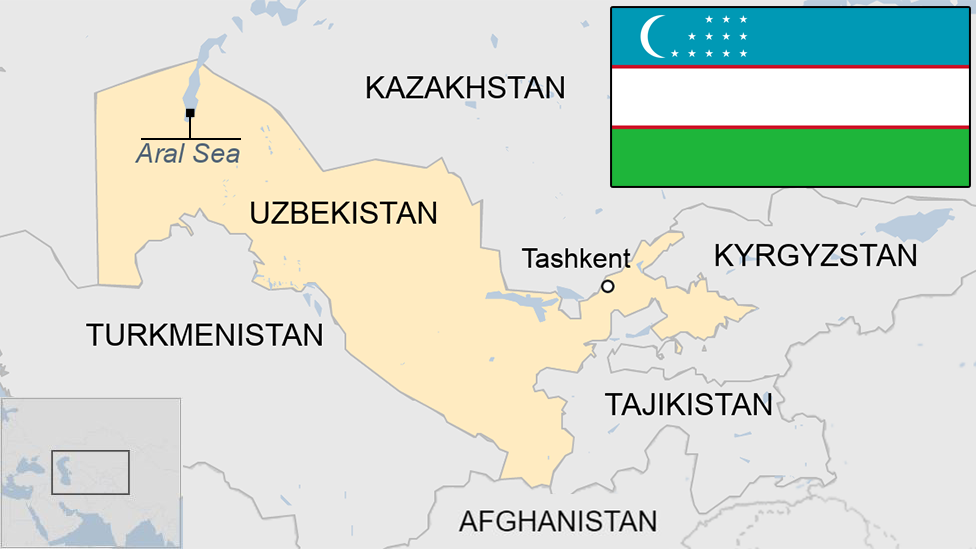Islam Karimov: Uzbekistan holds funeral for president
- Published
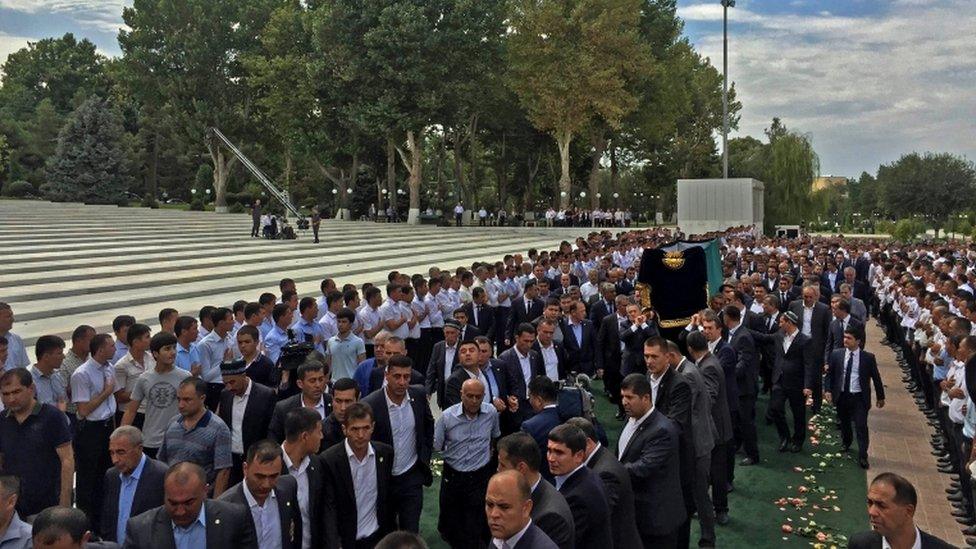
President Islam Karimov's coffin in Samarkand
The funeral of Uzbekistan's President Islam Karimov, who died after a stroke this week aged 78, has taken place in the city of Samarkand.
Thousands lined the streets in both Samarkand and in Tashkent, from where his coffin was earlier flown.
Karimov, one of Asia's most autocratic leaders, ruled for 27 years, and was accused by human rights groups of harshly repressing dissent.
Saturday's funeral comes amid uncertainty over who will succeed him.
The event in Samarkand - Karimov's home city - was overseen by Prime Minister Shavkat Mirziyoyev. Mr Mirziyoyev has been in office since 2003. His deputy, Rustam Azimov, is also seen as a key player.
Three days of mourning are being observed.

'No pictures!': BBC's Abdujalil Abdurasulov, Uzbek-Kazakh border
The climate of fear that Islam Karimov created prevails. Many citizens of Uzbekistan are reluctant to talk about him, even now he is dead.
I met a group of Uzbek construction workers in Shymkent, Kazakhstan, just across the border.
They greeted me with a smile, which quickly faded after they heard I wanted to talk about the latest developments in their home country. They refused to give me an interview.
"I can be detained by the SNB [security services] when I go home if I talk to you," one worker said.
Finally, I found a man who agreed to speak. "No pictures or names!" he warned. "The most important thing is that for 25 years he kept the peace," he said.

'Irreplaceable loss'
On Saturday, a funeral cortege carried the president's body to Tashkent airport.
His wife Tatyana Karimova and younger daughter Lola Karimova-Tillyaeva, dressed in black and wearing headscarves, were shown in tears as the coffin was loaded on to a plane for the short flight to Samarkand.
Steve Rosenberg assesses the legacy of Islam Karimov
Uzbek state TV then showed footage of mourners carrying Karimov's coffin through Samarkand's historic Registan square.
Russian Prime Minister Dmitry Medvedev and the presidents of ex-Soviet states Tajikistan and Turkmenistan were among those attending.
Mr Mirziyoyev said at the funeral: "Our people and Uzbekistan have suffered an irreplaceable loss. Death took from our midst the founder of the state of Uzbekistan, a great and dear son of our people."
After a mufti said funeral prayers in Registan square to the all-male mourners, the president's body was taken to be buried at the Hazrati Hizir mosque.
Karimov's other daughter, Gulnara, once seen as a possible successor but now believed to be under house arrest, was not seen at the ceremony.
News of Karimov's death was finally confirmed after several foreign leaders and diplomatic sources reported it on Friday, following days of rumours that he had already died.
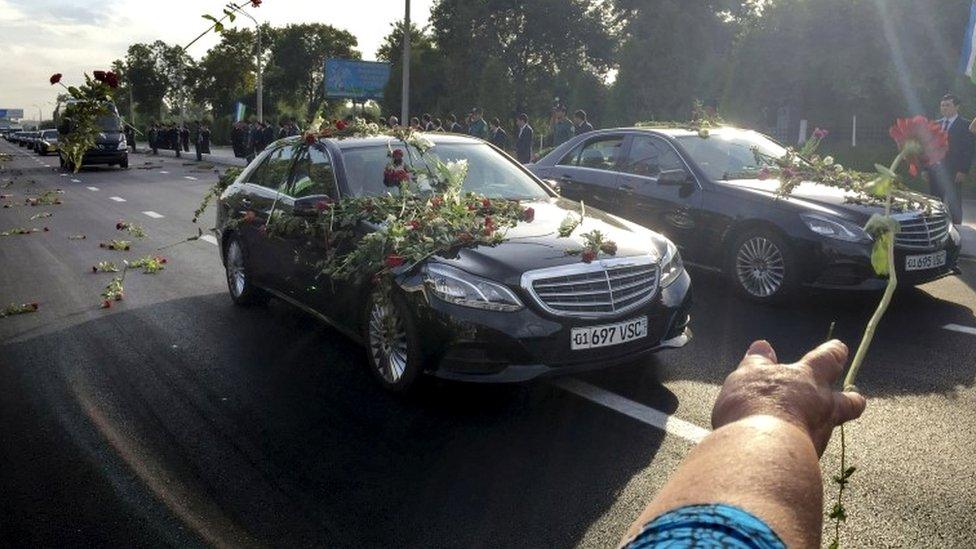
The cortege on its way to Tashkent airport
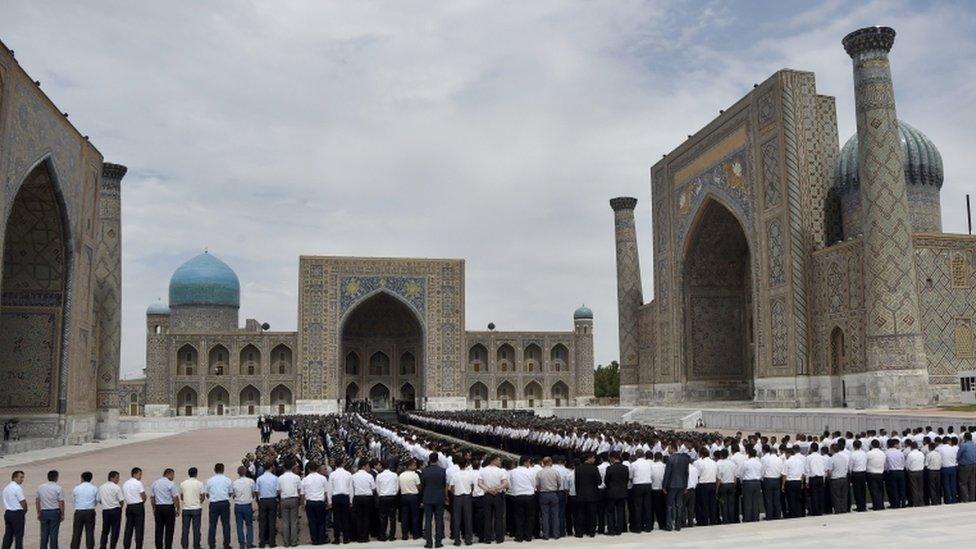
The coffin later passed through Samarkand's historic Registan square
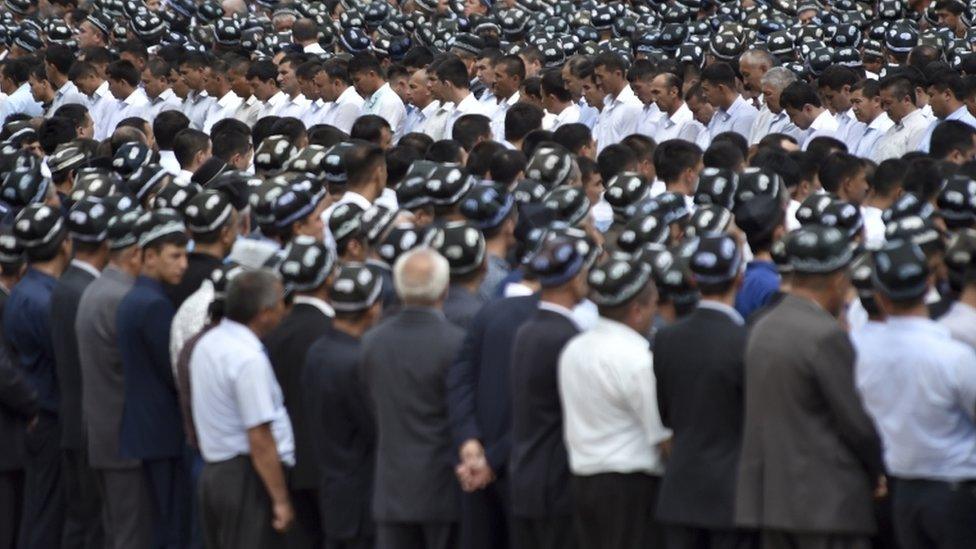
Uzbek men pay respects in Registan square
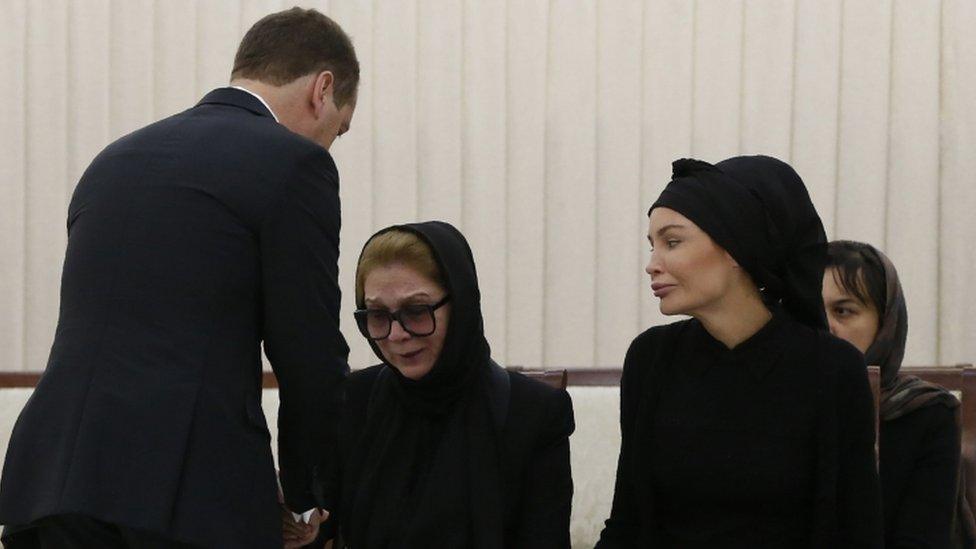
Russian PM Dmitry Medvedev consoles Tatyana Karimova and Lola Karimova-Tillyaeva
US President Barack Obama said in a statement the US remained "committed to partnership with Uzbekistan, to its sovereignty, security, and to a future based on the rights of all its citizens. for the people of Uzbekistan".
Expressing his condolences in a statement, external (in Russian), Russian President Vladimir Putin described Mr Karimov as a statesman "who had contributed to the security and stability of Central Asia" and who would be a "great loss for the people of Uzbekistan".
'Repression unchallenged'
A United Nations report has described the use of torture under Mr Karimov as "systematic".
The late leader often justified his strong-arm tactics by highlighting the danger from Islamist militancy in the mainly Muslim country, which borders Afghanistan.
Republic of Uzbekistan
Capital: Tashkent
-
Population 32 million
-
Area 447,400 sq km (172,700 sq miles)
-
Major languages Uzbek, Russian, Tajik
-
Major religion Islam
-
Life expectancy 68 years (men), 74 years (women)
-
Currency Uzbek som
Anna Neistat, a senior director of research with Amnesty International, told the BBC the late leader had repressed dissent unchallenged by the international community.
"For years and years Karimov was shutting down any type of opposition, throwing in jail anybody who he believed could challenge the regime," she said.
During a crackdown in the eastern city of Andijan, external in 2005, hundreds of people were killed.
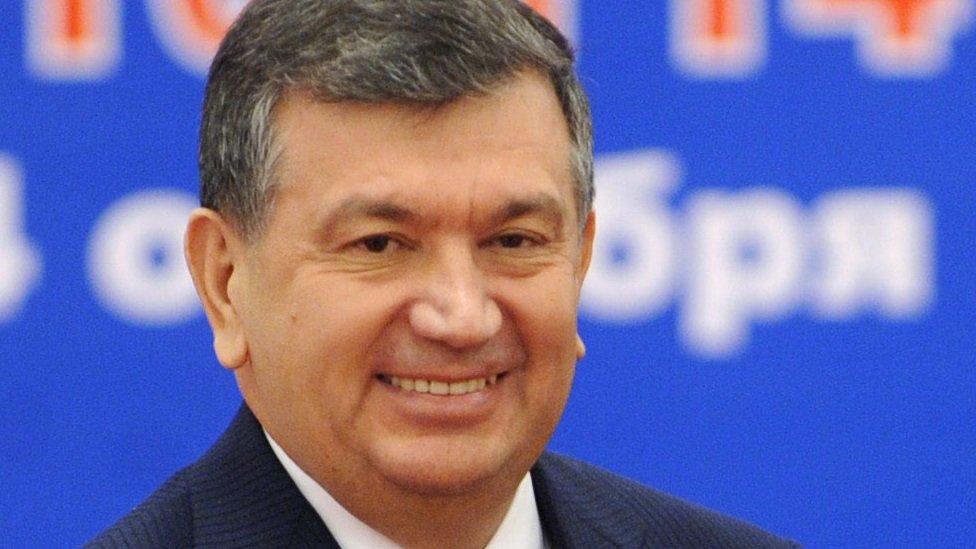
Some say Prime Minister Shavkat Mirziyoyev could have the upper hand in the succession
After a wave of car bombs targeted Tashkent in 1999, Mr Karimov said: "I am ready to rip off the heads of 200 people, to sacrifice their lives, for the sake of peace and tranquillity in the country. If a child of mine chose such a path, I myself would rip off his head."
His followers argued that curbs on freedom were a small price to pay for law and order.
- Published3 September 2016
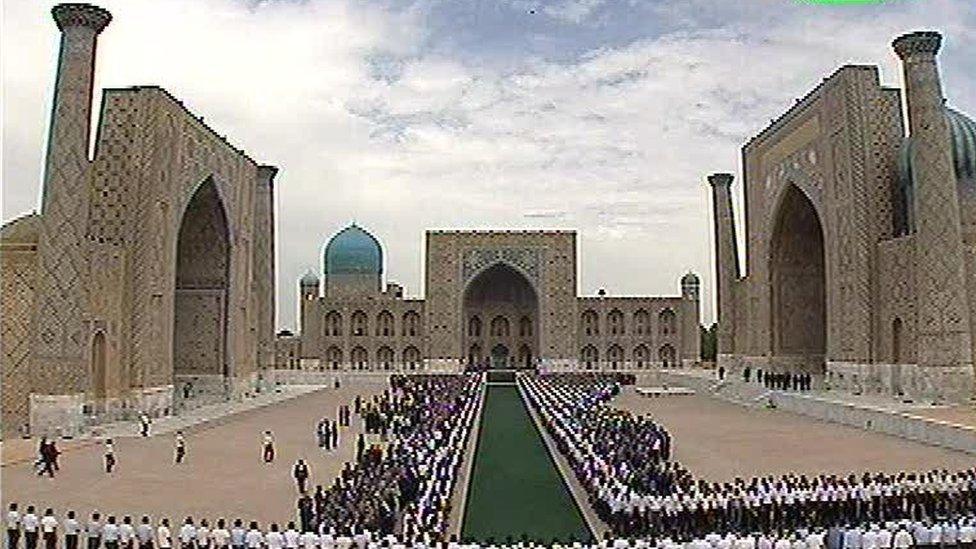
- Published2 September 2016
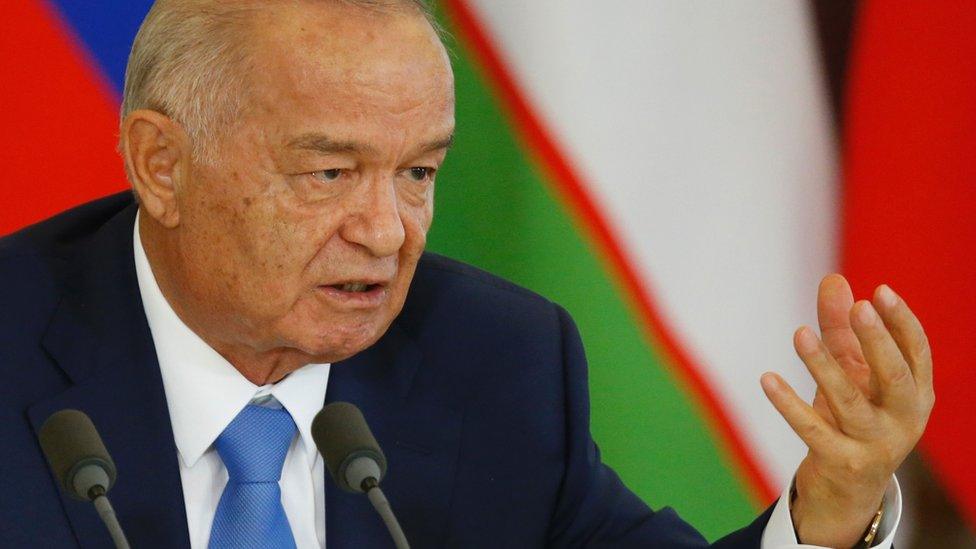
- Published29 August 2016
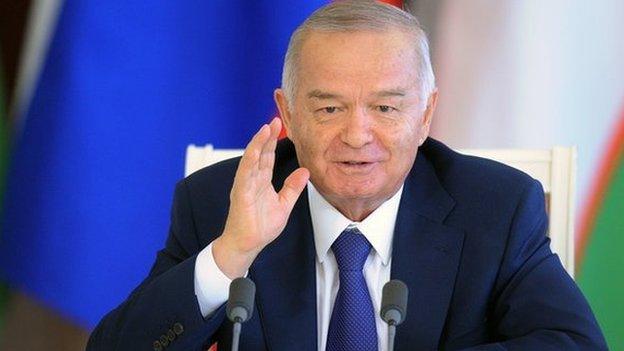
- Published30 March 2015

- Published27 March 2015
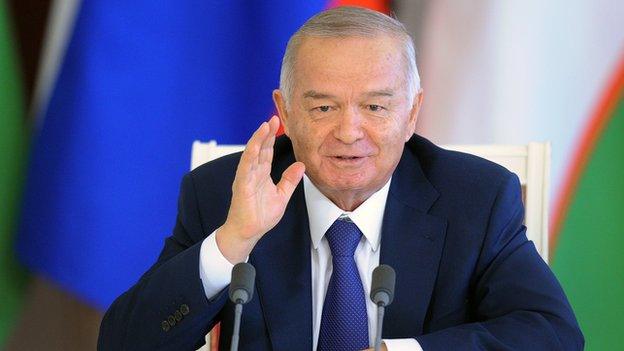
- Published9 March 2015
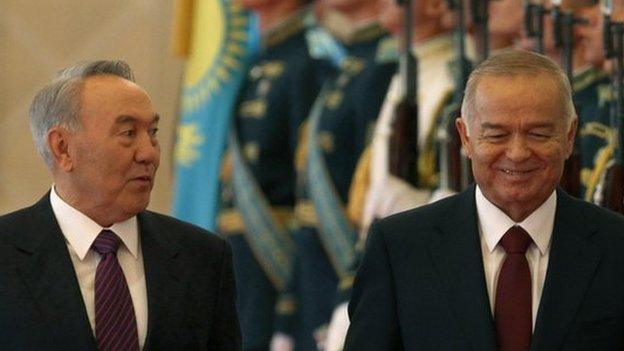
- Published24 March 2014
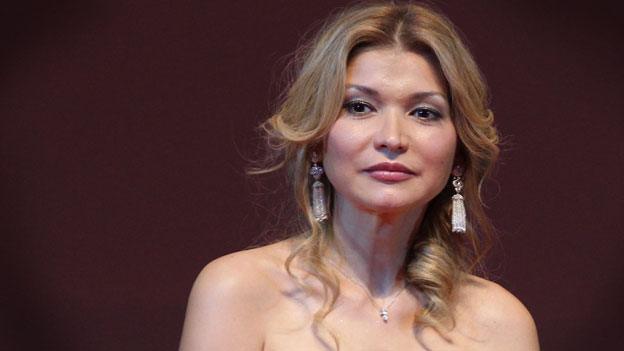
- Published30 October 2024
